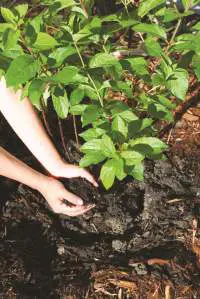Waste Minimisation
7 Nov 2013, 9:24 AM
Did you know the putrescibles (food waste) is one of the main types of waste contained in kerbside refuse bags?
By composting at home you can make your WDC blue refuse bags go further. Composting is cheap and easy to learn. Breaking down waste requires the right amount of moisture, heat, soil, aeration and a good mix of waste materials.
What is composting?
Compost is a mixture of organic material that is used as fertiliser. Generally, the ingredients used to make compost come from the kitchen or garden.
What are the benefits?
- Composting reduces the harmful effects of organic waste in landfill (eg, water pollution, emissions of the potent greenhouse gas methane and bad smells).
- Compost is a rich source of nutrients that can help you grow a healthy and plentiful garden and reduce the need for chemical fertilisers.
- Composting reduces household rubbish disposal costs.
- Composting reduces the space needed for garden waste in landfill.
What can I put in my compost bin?
For a healthy compost mixture, you need a good balance of:
Greens + Browns + Water + Air = Compost
|
Greens (high nitrogen content)
|
Browns (high carbon content)
|
Quick tips for composting at home:
-
Keep a small kitchen bin in a handy location in your kitchen, for food scraps. You can create a kitchen bin out of a plastic bucket or ice-cream container.
-
Place or build your compost bin in a sheltered, level area of your garden that has good drainage and is easily accessible.
-
Before positioning the bin on the site, turn over the soil with a garden fork or spade to encourage earthworms into the heap.
-
Start the compost heap with a 10cm - 15cm layer of coarse material such as tree clippings (small branches or twigs).
-
For optimal results, turn the heap every few weeks to increase air circulation and expose fresh materials to insects and other organisms. Add water if the compost heap becomes dry. It takes approximately three or four months for the compost to mature, if it is regularly turned.
-
When working with compost, wash your hands after handling soil or compost and protect broken skin by wearing gloves. Avoid working in confined spaces when handling soil or compost.
-
You can use your compost at any time of the year. Early spring is a good time to add compost to your garden to help boost soil fertility. Mix the compost into the top 5cm - 10cm of your garden soil.
